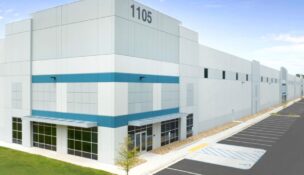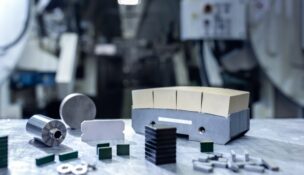Women can play role in alleviating manufacturing workforce skills gap
Melinda Waldrop //April 15, 2021//
Women can play role in alleviating manufacturing workforce skills gap
Melinda Waldrop //April 15, 2021//
Women make up just 29.5% of a manufacturing labor force that needs to fill 4.6 million jobs during the next decade, and three S.C. industry leaders think it’s high time that number grew.
Lindsay Leonard, senior director of national strategy and engagement for Boeing South Carolina, has been with the North Charleston-headquartered company for seven years. She acknowledged during a recent online forum hosted by the National Association of Manufacturers, The Manufacturing Institute and West Columbia-headquartered Nephron Pharmaceuticals Corp. that while she didn’t necessarily plan on career in manufacturing, that path has yielded many rewards.
Chief among them, she said, was helping launch Boeing’s second 787 Dreamliner final assembly and delivery facility.
“We all got to be part of and are still a part of building something,” Leonard said. “That’s probably the advice I would give to people and women in particular considering manufacturing. You’re part of building a product. In our case, it’s airplanes. You’re part of building an ecosystem. You’re part of building people’s futures. And manufacturing facilities are generational career choices. They’re around for much longer than my individual career. Pretty much everything that I get to do, I see a tangible result. That’s a pretty cool place to find yourself in your career.”
According to the Bureau of Labor Statistics, women made up 29.5% of the country’s manufacturing workforce in 2020, though the industry continues to be search of a workforce pipeline infusion. The most recent research from The Manufacturing Institute found that as of August 2018, there were 508,000 open manufacturing jobs in the U.S.
A skills shortage could leave nearly 2.4 million positions unfilled by 2028, organization research found, with 51% of executives citing “maintaining or increasing production levels to satisfy growing customer demand” as the biggest challenge stemming from not filling open jobs in the next three years.
The Manufacturing Institute, a workforce and education partner of the National Association of Manufacturers, is trying to attract those workers from untraditional sources through programs such as its STEP Ahead Women’s Initiative, aimed at honoring and promoting the role of women in science, technology, engineering and production.
Boeing provides support and resources for women through company and community efforts, Leonard said, including mentoring programs such as its Dream Girls initiative in local churches.
“It’s not just good enough for us to stay within our workforce. We reach well back into the pipeline,” she said. “At Boeing South Carolina, we support early childhood education and the things that help girls succeed.”
Katarina Fjording, head of Volvo Car University with more than 30 years of global industrial operations experience, said the North Charleston-based arm of the automobile giant also focuses on building its female workforce through its cultural values including a generous family leave benefit.
Fjording, a mechanical engineer who oversaw the building of Volvo Car’s Ridgeville production facility, has simple advice for women considering a career in manufacturing: “Do it. I have never regretted going into industry. Manufacturing today, in respective companies, is clean, it’s safe, it’s well-paid, and creating is very rewarding. Also, the manufacturing industry is very broad. The career possibilities are endless, both for generalists and specialists. It’s also very interesting, and it’s fun.”
 Lou Kennedy, owner and CEO of Nephron Pharmaceuticals Corp. since 2007, has grown used to being the only woman in a roomful of bankers or lawyers.
Lou Kennedy, owner and CEO of Nephron Pharmaceuticals Corp. since 2007, has grown used to being the only woman in a roomful of bankers or lawyers.
“This is a very nontraditional female role. There are not too many of me, a CEO in the pharma or device industry,” said Kennedy, who was elected to the National Association of Manufacturers board in March. “It’s a shame, too, because what we bring to the table, I believe, is a great attention to detail and many other strengths, our emotional intelligence and so forth, really can help move an organization forward.”
Nephron develops and produces generic inhalation solutions and suspension products and operates an outsourcing division that produces pre-filled sterile syringes and IV bags for hospitals across the U.S. Nephron’s certified diagnostics lab has taken a leading role in COVID-19 testing, and the company is operating a vaccine facility in conjunction with Dominion Energy near Nephron’s Saxe-Gotha Industrial Park campus.
That campus is growing through a $215.8 million expansion that will include a vaccine production facility, and Kennedy is in the market for a vaccine production partner as her company continues to broaden the footprint established when its headquarters relocated to West Columbia from Florida in 2017.
Certified by the Small Business Administration as a woman-owned business, Nephron’s workforce is 53% female, Kennedy said.
“We attract other women because we’re living it every day,” she said. “When we’re interviewing, I don’t think about I need a female or a male. I always look for the right person, but I do believe because we have lot of high-energy, great-work-ethic females here, we tend to attract that type of personality in our workforce, and it’s served us well. We’ve had unprecedented growth. We have 42 countries represented here, (and) we all know, the more diverse we are, the more productive we are.”
Kennedy advises women, in manufacturing or any industry, to “be bold and don’t be afraid to fail,” while Boeing’s Leonard encourages women to consider a manufacturing career for reasons that go beyond the job.
“In manufacturing, the world is your oyster,” Leonard said. “It’s endless possibility and opportunity, and if you reach out for something that maybe you didn’t think was going to be your path, it may provide you personal growth and benefits in ways that you never thought possible from your career.”
P















